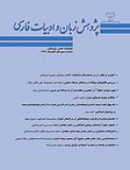تحليل مضامین پارادوکسیکال مولوی بر اساس روش تحلیلی یونگ
محورهای موضوعی : پژوهشهای ادبیات کلاسیک ایرانسید ماجد غروی نیستانی 1 , مجتبی زروانی 2
1 -
2 -
کلید واژه: پارادوکس مولوی یونگ خویشتن شر رنج,
چکیده مقاله :
در این مقاله نخست منظورمان را از واژه «پارادوکسیکال» روشن میسازیم. سپس در قالب سه الگوی اساسی خواهیم دید که تعابیر پارادوکسیکال مولوی، یا به ابزاری بلاغی برای آراستن سخن فروکاسته شده، یا در قالب شطحیات خوانده شده و یا به روشی منطقی برای تفهیم مطلب تقلیل یافته است. این الگوها، هرچند در اغلب مواضع راهگشا هستند اما بیشتر در صدد حل وفصل معضل پارادوکس هستند تا معرفتشناسی آن. در این مقاله، با توجه به تفسیری که یونگ از پارادوکسهای بنیادین در وجود آدمی ارائه می-دهد، چشمانداز جدیدی برای تحلیل این مسئله در اندیشه مولوی ارائه شده است. توجه داریم که این مقاله مقارنه و مقایسة اندیشة مولوی و یونگ نیست؛ بلکه صورتبندی الگوی یونگ برای تحلیل پارادوکس، و بهکارگیری این الگو در اندیشه مولوی است. بر اساس این الگو، عارف در ژرف ترین سطوحِ «خویشتن» با پارادوکسی وجودی روبهروست و این تناقض عمیق را تضمین کنندة بالندگی خویش و حصول معرفت می پندارد.
We first try to clarify our meaning of “paradoxical”; then, we shall see in format of three basic samples that the paradoxical phrases used by Molavi turn to: rhetorical device to array a reduced speech, or is read in a contradictory format, or is reduced to a reasonable method to realize the words. Although these samples are useful guidelines in most cases, they are mostly to solve the problem of Paradox rather than its epistemology. According to the interpretation of Jung on Fundamental paradoxes in human existence, this article tries to provide a new perspective to analyze this issue in Molavi’s thought. This article is not a simultaneity and comparison of Molavi and Jung Mind-set; but it is the formulation of Jung Model for Paradox Analysis, and applying this sample in Molavi’s thought. According to this sample, mystic is encountered with an existential paradox in the deepest levels of “self” and considers this deep contradiction as the voucher of self growth and reach of knowledge.


